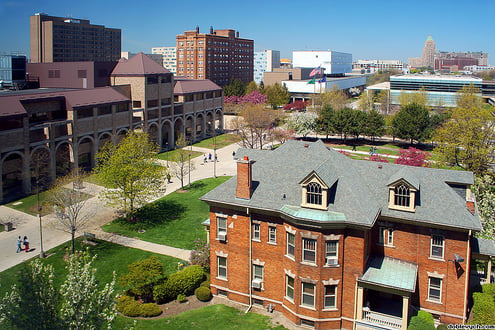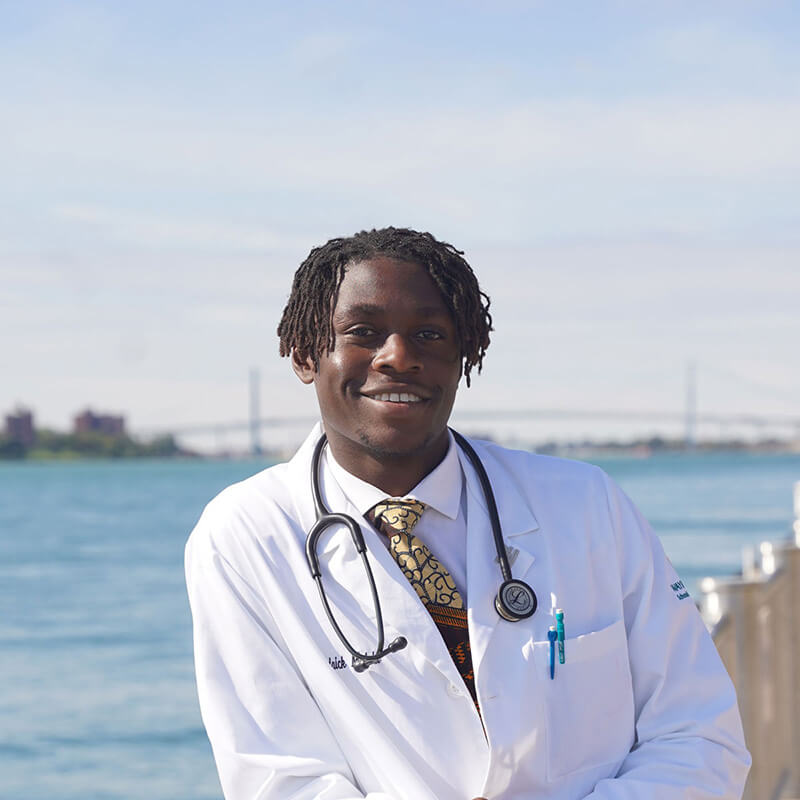A good friend once told Detrioit’s Cedric Mutebi that “our bodies see inequities before our minds do.” The words instantly resonated.
“This really speaks to how, as physicians, we see the result of inequities before anything else,” the third-year student at Wayne State University School of Medicine continues.
“We see them in our emergency departments, we see them in our clinics, we see them in our operating rooms. I believe that, because we have the ability to see them before anyone else, we have the responsibility to act on them.”
As the co-founder of a groundbreaking antiracism subcurriculum that was part of Wayne State residency studies last year, Mutebi represents a new generation of physician-activists in the Motor City. He is this year’s recipient of OnlineMedEd’s Future Black Physicians scholarship.
A first-generation Ugandan-American, Mutebi was a talented high school wide receiver who turned down college scholarships to pursue a passion for overturning disparities in medical education and health care.
… as physicians, we see the result of inequities before anything else. We see them in our emergency departments, we see them in our clinics, we see them in our operating rooms. I believe that, because we have the ability to see them before anyone else, we have the responsibility to act on them.
Ongoing discrimination, the contentious use of race in medical research, and a lack of minority presence are engrained in American health care and medical education. The Covid-19 pandemic only exposed the disparities further. Mutebi’s frustration with it all has only fueled his rise.
“What I think what [Bailey’s] quote captures, and points towards, is our need to speak out, act out, and serve towards the greater mission of improving health inequities in our communities,” the 23-year-old says.
“We have that goal; we have that responsibility. It is the anchoring piece to the work I do, and many of my friends do, concerning health inequities here in the United States. It captures my motivation for being [in medicine], too.”
Opening Doors
In search of better education, Joseph and Lucy Mutebi emigrated from Uganda to Detroit in the early 1990s.
Cedric Mutebi’s father came first, to study accountancy at Wayne State, before his mother followed after initially studying in London. She would work as a hospice nurse, and had three sons with Joseph: Nick, Cedric, and Chris.
Nick, 25, is now a sports business executive at the NBA, while the youngest brother, 18, has recently graduated high school and plans to become a pharmacist.
Growing up, the Mutebi family made annual Christmas trips to Uganda to visit family, providing the boys with context of their larger African family, and a true counterpoint to life in Rosedale Park, where they lived. “For me, it was an educational time,” Cedric says. “You get to see the majority of family and be in community with everyone.
“[It] also showed . . . all the sacrifices our parents made for us. They left their siblings, parents, and closest friends to provide an opportunity for us in the United States. It was a real eye-opener and has helped me stay humble.”

Visits often included lengthy time at Opening Doors, a Kampala children’s educational home, his mother co-founded with her sister in 2004. Mutebi serves as the American-based secretary and fundraiser coordinator for the nonprofit. “It was one of my first [touch points] with health and health care as a way to show love,” he says.
American football and basketball dominated Mutebi’s early motivations. With a walk-on roster invitation from the Michigan Wolverines amongst his college offers, long nights were spent contemplating the fork between sports and the medical profession. The lure of being a physician would prove too much for Mutebi.
A public health graduate, Mutebi made his way into medical school through Wayne State’s Med-Direct program, which pays ten liberal arts graduates to complete a medical degree. The program started in 2016 under the guidance of Dr. M. Roy Wilson, Wayne State’s celebrated president and famed former physician.
“In my mind, it came down to what would it look like if I put as much time and energy as I put into sport into pursuing a health care career,” Mutebi says. “It was a curiosity of what it would look like. From there, I had the opportunity to join the Med-Direct program, and the rest is history.”
Mutebi had some serious runs on the board before med school started. He directed a 2018 statewide challenge for Wayne State, to train people in CPR. He completed research for the American Association of Medical Colleges (AAMC) on the lack of Black athletes who eventually pursue medicine and for the National Institute of Health (NIH) on why more Black patients reject heart transplants than other groups.
We’re so hyper-focused on our studies, but when you close the books, reality hits in again. You can’t just sit idle while everything is happening.
After an internship with the Congressional Black Caucus in Washington DC in early 2020, Mutebi started medical school with Covid-19, and its widespread complications, in full swing.
Involved in a food raising and delivery campaign and testing and vaccination drives, he looks at the pandemic as a moment that undeniably exposed the disparities in American health care.
“It made me even further question my role as a [future] physician,” he says. “What is our role here as medical students during a time like this?
“This was also a few months after the murder of George Floyd. It all comes back to the same question and your community. We’re so hyper-focused on our studies, but when you close the books, reality hits in again. You can’t just sit idle while everything is happening.”
Healing Between the Lines
Mutebi says his journey toward medicine had three major moments of affirmation. The first came in the back seat of the family car.
As kids, he and his brothers would often wait there while their mother—a hospice and oncology nurse—would make patient visits. When she arrived back, she’d talk about patients with animation and a sense of pride in her opportunity to help them.
“She would know so much about their lives,” he says. “She would describe who they were and their experience in a way that bought her so much joy.
“Seeing her express that much happiness and gratitude to be a part of their lives and get from point A to point B with whatever condition they were dealing with made me want to feel that same way.”
Participating in an after-school Detroit city health department program was the second, while the third—and hardest hitting—came when Mutebi started volunteering as an HIV counselor. It was his first time in a hospital setting. He remembers sharing news of a positive test with a patient for the first time.
“Having to tell someone from my community, who looked like me and grew up in a neighborhood down the street, that he was HIV positive was something that made all the disparities and everything I learned when it came to health outcomes tangible,” he says.
“It made it [very] personal. At that moment, it was clear that I had to be in this space so I could work against these disparities and look to find ways that all of us have opportunities to live as healthy as possible.”
In his first year of med school, the more he learned about the use of algorithms in medical research and how they perpetuate health disparities, the more shaken up he got.
Mutebi’s response was Healing Between the Lines. “This was our initiative to bring medicine into the frontlines of the fight for justice during a time when we had seen medicine fail so many of our communities,” Mutebi says.
Founded with third-year resident Dr. Selena Rodriquez, Healing Between the Lines seeks to “reimagine” medical education by providing greater context to residents about the wider influences of disparities in American health.
From Detroit to Grosse Pointe, you can go one mile and have a 15-year difference in life expectancy—but what is the difference in that mile. You think of education resources that are given; you think about health care facilities or the ratio of physicians to residents. You have to ask why that is happening and then build policy to say here’s how we can influence that or change the system as it operates.
Lessons began in June 2021, the discussions being led by community organizers and activists. From the effects of housing “redlining,” to incarceration programs, sexual education, and issues within the American justice system, topics varied greatly.
At the end of six months, residents and partner organizations co-hosted an online symposium for other medical professionals, discussing equitable health. Mutebi says three policy proposals came out of it. Though a pilot program, he is hopeful of it being a permanent fixture for WSU residents moving forward.
“From Detroit to Grosse Pointe, you can go one mile and have a 15-year difference in life expectancy—but what is the difference in that mile,” he says.
“You think of education resources that are given; you think about health care facilities or the ratio of physicians to residents. You have to ask why that is happening and then build policy to say here’s how we can influence that or change the system as it operates.”
“. . . just doing the work, day by day.”
Mutebi’s drive forms the newest part of Detroit’s rich legacy of physician activism. As part of his scholarship video submission, Mutebi presented from the former Dunbar Hospital near the Wayne State campus.
Opened in 1918 by Dr. James Ames and 29 other Black physicians, the hospital was the first for the city’s Black community. It was named after Paul Laurence Dunbar, a famed post-Civil War Black poet.
Demand forced Ames to move to a larger facility a decade later, but the hospital continued to provide care for Black Michiganders until 1962.

“You walk into their footsteps,” Mutebi says. “They didn’t have as many resources as we have, but they opened the door for us to be here.
“We are still fighting the numbers in terms of representation in this space, but it does give me hope when I look around and see my support group. They look like me and can relate the same experiences that got us here.”
“I always remain hopeful and energized when I think about Dr. James Ames, the Northcross family, and all of those in this long lineage of physician activists. Their work inspires me to do more. Their work laid the foundation for the work we do now.”
Recent times have seen Mutebi interact with contemporary role models. After an impressive decade at the helm, Wilson—a personal mentor and advocate for Mutebi’s medical journey—stepped down from Wayne State last week.
As a participant in Michelle Obama’s Reach Higher initiative in 2018, Mutebi asked a question of the former First Lady about the feeling of needing to justify belonging in the “different circles” he has entered in his life.
“Trust me; it will continue beyond college, no matter where you go,” Obama told him. “There were people who thought Barack couldn’t be a good president. There were people who questioned whether I would be a good First Lady.
“That doesn’t go away. You have to practice knowing who you are and focusing on doing the work day by day.”
In medicine, we are fortunate to be granted trust during some of people’s most difficult moments. With that comes great power and responsibility for us to do right by them and their ultimate wishes—to be as healthy as possible [and] live full lives.
On the strength of his trajectory since 2018, it’s fair to say the 23-year-old has taken Obama’s words to heart. The reason he wishes to do a cardiology residency shouldn’t surprise anyone.
“[Heart disease] is the number one killer in our community, the Black community,” he says. “The heart is central to most disease processes when you think about ultimate morbidity and mortality.”
“I got into [medicine] as a way to connect with people and help people’s lives,” Mutebi continues.
“In medicine, we are fortunate to be granted trust during some of people’s most difficult moments. With that comes great power and responsibility for us to do right by them and their ultimate wishes—to be as healthy as possible [and] live full lives.”



